|
On July 16th the 42-E group of ten
Foster Field graduates suffered their first loss. While flying above Fredericktown, Maryland, the plane flown
by ------------- collided with one flown by Bob Palenscar.
No one, including Palenscar, saw the actual contact of
the planes. Palenscar
noted feeling a bump and looking out the right side of his plane
to find his wing gone. Richard
Conly witnessed the aftermath of the accident. “Both Palenscar
and ---------- managed to bail out of their planes”, reported
Conly. “------------- unfortunately opened his chute too soon and
it became caught on the vertical stabilizer of his P-40.”
The plane plummeted down, dragging its pilot with it.
The following day plane and pilot were located and raised
from a tributary flowing into the Sassafras River by a wreck
squad from Fort Dix, N.J.
History of the 60th Fighter Squadron Supplement
OCTOBER 21, 1942 Flight Echelon
This morning, twenty-seven pilots of this Squadron under command of Major Franklin W. Horton, left Bolling Field, D.C., for Norfolk, Va., flying “P-40s. Upon arrival at Norfolk, the planes landed at the “Norfolk Naval Station”. This group of pilots was to be known as the “Flight Echelon”. The pilots were then quartered aboard the converted airplane carrier “Chenango”. The planes, together with those of the other squadrons of the 33rd Group were stowed away on the “flight deck” of this ship.
Dick Coulter Diary Entry
Saturday, October 24
The great adventure has begun! We pulled anchor at 9 A.M. I have seen the last of the U.S. for some time. Rumor has it that we are going to French Morocco. This came from Robertson and he told his wife, so Baby (Coulter’s wife) should know before long.
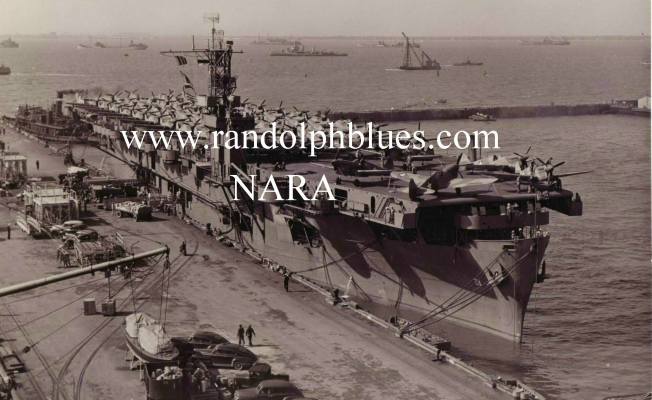
The
P-40s, once in the air, had no option but to land at Pt. Lyautey.
The tiny carrier deck was much too small to allow them to
return to the USS Chenango.
Pilot Jack Mann recalled being told “by the powers that
be”, “Don’t worry – if you can’t land at Port Lyautey,
you can fly on to Gibraltar.”
“Later,” Jack reports, “we found out we didn’t
have fuel to get there. So
much for Army Intelligence.”
Lt. Ed Moses was in the air when he heard about the
damage to the field. A
shell crater about fifty feet in diameter was about halfway down
the runway, not leaving enough room on either side of it for
landing. Lining up
on the crater Moses was able to bring his P-40 down hard just
short of the hole. The
plane bounced into the air, came down on the other side of the
crater and slowed to a stop undamaged.
Others tried avoiding the crater, by pulling off the side
of the runway. The field along the runway, however, was also
tricky. It had
rained much of the previous day, turning the earth along the
runway into a sticky mud that caused the planes to nose over in
a somersault. Only
five of the twenty five planes from the carrier landed
undamaged.
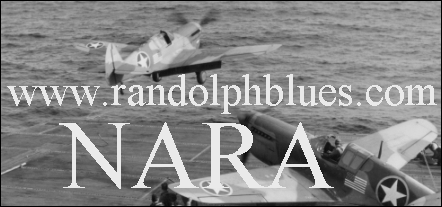
Coulter Diary Entry
Sunday,
Dec 6
We flew to Oran and stopped for about 30 minutes.
Got to Algiers about noon.
Left there 2:45 escorting 8 transports (4 to Constantine
& 4 to Tebessa). We
followed the wrong 4 and arrived at Constantine.
Decided to land (small field!).
McLeod (“Dog”) stalled
at 200 ft. in approach turn, fell
straight in and was killed! He was flying Stech’s plane
(Lady Bet). An
awful thing – I am sick over it.
Staying in Constantine tonight. Dog’s body taken to
military hospital there.
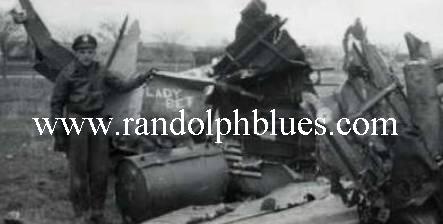
FIRST FIGHTER GROUP JOURNAL
2-22-43
Twenty-six
P-38s, 1st Fighter Group up base 1600 hrs, to strafe
Kasserine Pass. Three
returned early due to late takeoff.
Formation strafed trucks, tanks and troops moving through
the pass. Hits
observed on a few trucks but little damage done, due to the
great amount of flak. Fire
was opened on formation by Allied forces before reaching
strafing point resulting in loss of one aircraft.
NW of pass many friendly and enemy tanks and troops
observed in what seemed to be a large battle.
Some troops and tanks fortified in pass.
Two P-38s, Capt. Rimke and Lt. Chambers did not return.
Twenty P-38s down base 1745 hrs.
One P-38 down base 1835.
Information given before mission proved to be grossly
inaccurate.
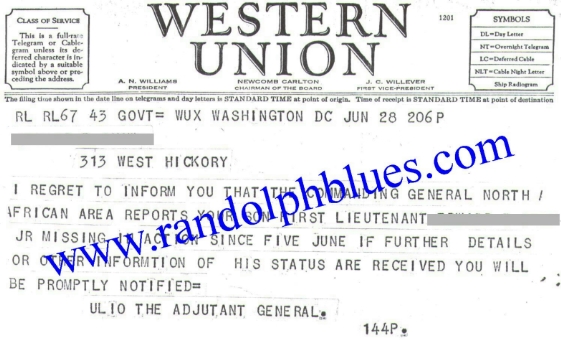
History of the 27th Fighter Squadron Supplement
March 8, 1943
Second
Lieutenant Virgil E. Radcliffe went after three enemy aircraft,
which were crossing from his left to the right.
Picking the lowest of the three, Lieutenant Radcliffe
attacked. Firing
his machine guns as he closed in from 350 yards to 150 yards,
the Lieutenant struck the aircraft in the engine and cockpit.
Continuing on his original course, smoke seeping from his
engine, the enemy took no evasive action but eventually burst
into flames. Eventually
he fell off to the right and fell into a dive, burning.
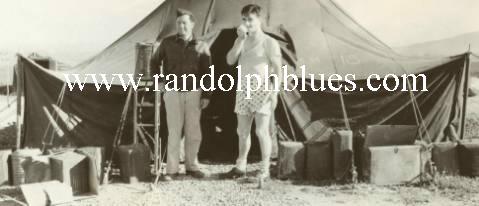
Lt. Dowd letter:
Dear Mom, Dad
and Kids
Please excuse the blot folks, but paper is so scarce that
I’m going to use this sheet anyway.
Gee your letters are super swell.
Mail has been coming in quite regularly lately and I have
about all of your letters up to Feb. second and boy if you only
knew how happy I am to receive them especially after going so
awfully long without a single letter.
They’re coming in by the bagful and boy how I love it.
I’m sure a lucky guy and also a very happy one.
The best wife and family in the world, the wife loves the
family and vice versa – oh boy!
I miss you all terribly and especially your cooking Mom.
Lt. Radcliffe Letter
North Africa April
21, 1943
Dear Frances,
I was might happy to have a letter from you waiting for
me when I returned from “rest camp.”
I wish you could
have been at the resort where I spent the ten days.
It was a lovely place for hiking, horseback riding,
picnicking, etc. We
really had a good rest and a swell time there.
But then I was glad to get back to the squadron.
Of course fighting isn’t exactly fun but I don’t like
to sit back while the other fellows do it.
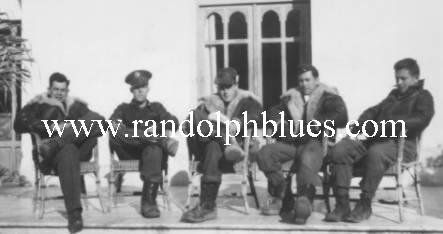
History
of the 60th Fighter Squadron Supplement
MARCH
29, 1943 – ADVANCE AND F
LIGHT ECH
ELONS
Twelve
of our ships took part in a reconnaissance sweep of the La
Fauconniere area. Four
ME-109’s were encountered.
In the ensuing combat, Captain Rathbun hit one enemy
plane, which was seen to crash.
Lt. Linn hit another, the tail of which blew off and
which then emitted a thick stream of black smoke as he turned
downward. Lt. Neal
hit another, the right side of whose engine was seen to explode.
Captain Rathbun’s and Lt. Maneely’s planes were hit
and damaged during this melee and later, Lts. Palenscar, Matuch,
Cross and Maneely damaged enemy planes.
Near Sbeitla, three enemy planes were encountered as they
were strafing the area. Lts.
Hemphill and McBride shot down one each of those.
All our planes and pilots returned safely to the base
with the exception of Lt. King who is unaccounted for.
On
the next mission of the day, seven planes took off on an alert
to intercept the enemy in a dogfight over the field.
As these planes approached, the enemy turned tail and
left the vicinity.
The
above two missions are, perhaps, the most interesting of the war
as far as the ground personnel is concerned.
Previous to them, they have only been able to hear the
stories of victories and air battles, but, today, we were given
a “front seat” at the big show.
The dogfight over the field was a sight never to be
forgotten.
The
next mission of the day was a fighter-bombing mission over
Mezzouna. Much enemy
ground activity and lots of flak was encountered in the target
area, and Lt. Palenscar’s plane was hit by ground fire and he
went down in flames. Captain
Rathbun’s ship was badly shot up but he managed to
successfully return to the base.
Coulter
Diary Entry
Thursday,
April 1
Two
missions today, both escorting A-20s.
On the first to El Djem Chase got two and Matuch one.
Lee (Robertson) got the hell shot out of him including 6
20mm shells, but struggled back for a belly landing.
I went on the second mission which was a dry run because
of overcast. Hemphill
and Keller are both back and their ships each got six 20mms in
them. Keller and Lee
are getting the Purple Heart for slight injuries.
Moymer is now claiming 4 Stukas and 6 probables.
Our planes are getting shot and are showing wear.
Coulter
Diary Entry
Wednesday,
April 7
On a twenty-four ship dawn
reconnaissance with the 58th. They
shot some trucks. The
8th Army and our forces got some Italians trapped
between Mezzouna and El Guettar.
A mission bombed them on the road.
We went in with thirty-six more later and bombed the
arsenal and strafed hundreds of dispersed trucks.
I destroyed two and damaged three others.
On my last pass I was hit head-on in the engine with an
explosive 20mm taking out the oil tank, air mag. and
supercharger. It
caught fire but went out soon.
The engine kept going and I made for our lines on down
the valley. When I
had sufficient altitude I got Bill (Jones) to lead me a straight
course home. The
engine had no oil – it was all over me; I had a hard time
seeing with oil in my eyes.
It burned me slightly.
I landed O.K. mostly by guess.
I will get the Purple Heart.
Capt. West bailed out just over the lines.
He may get back. Matuch,
Linn and Keller are missing.
The last two should be in our lines.
Two out of the 58th are missing also.
Lee (Robertson) got a 20mm in his wing.
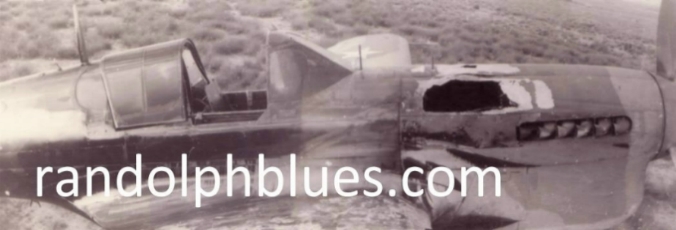
Matuch Shot down
“My
P-40 had just become airborne when my engine coughed once, kept
running, but not very smoothly.
Here was a dilemma! I
could not land my ship and abort the mission because of armed
bombs. I had to drop
them first. By this
time we had reached our assigned altitude and throttled back to
cruising speed. At
this power setting my engine sounded good.
It was only about 50 miles to the target so I decided to
continue on the mission and drop bombs on target.
When
we reached the target we dive-bombed in trail.
I released my bombs, pulled up and banked sharply to find
a target to strafe. I
picked up a transport truck in my gun sight and fired off a
burst. Pieces of the
truck flew off in all directions.
I had ‘essed’ in the other direction to find more
trucks when I noticed that I had fallen behind and did not have
power to catch up. I
radioed my Squadron Commander and advised him that I could not
stay with the Squadron but would try to get back to base by
myself. I don’t
believe I heard a response.
By this time there were no planes in the vicinity and I
flew west between two mountain ranges.
My P-40 was flying at about 150 miles per hour, that was
all I could get. I
was a sitting duck if I came into anybody’s gun sight.
I
was not positive of my exact position but felt that I should be
close to the American lines.
A gap in the mountains permitted me to make a right turn
and head north. When
I cleared the mountains there was the open desert in front.
Nothing but boulders and gullies.
I picked a heading that should take me to Sbeitla and
safety. Before I
could relax, a machine gun burst into life from the desert about
100 feet to my right. There
was no way they could miss and they didn’t.
The engine, which had just barely been running, came to a
dead stop. Oil and
coolant came gushing like a flood covering my canopy like a
blackout curtain. I
attempted to roll the canopy back and gain some vision but it
would not roll. I
reached for the emergency release and gave it a pull; nothing
happened.
Now
I am in total quiet and total darkness.
In a split second my mind tried to analyze the situation
and decide on some action. But
what? A picture
flashed in my mind of a plane crashing in the desert, rolling
into a ball and bursting into flames, the pilots still alive and
burning. This is not
acceptable. I
unbuckled the shoulder harness and the seat belt.
I lined up my head with the gun sight.
Now, when I crash, I’ll be thrown forward and bash my
brains out on the gun sight.
A nice clean death that was much better than being burned
alive. How long did
this decision take? Only
a split second, then a few seconds to throw off my harness.
What more could I do?
During
all my flight training I had been taught that in case of
emergency at low levels always fly straight ahead.
This was such a case but this was a good time to break
that rule also. My
air speed was down to 120 mph so I decided to make a 180-degree
turn on instruments and bring my air speed down to 90.
This would keep me from stalling out but make as soft of
a crash landing as possible.
I had completed my turn and sat there waiting for the
crash. My airspeed
was 90 mph as I sat and watched the instruments.
All of a sudden my air speed read zero.
My P-40 had made the smoothest landing I had ever sat
through. I had
nothing to do with it. There
must have been angels under my wings!
I
tried to get the canopy open but it still refused to budge.
I noticed that the string of bullets that had hit me had
sewn the canopy shut. There
were bullet holes in front of me and holes behind me.
Obviously there was not a bullet destined for me that
day. Then there was
a noise and activity around the cockpit and in a few minuets the
canopy was pried off by a group of excited and laughing German
soldiers. These were
the ones that had shot me down.
They were a forward observation post with a light tank
hidden in a gully along with a Volkswagen ’jeep’.
Their first action was to grab for souvenirs.
My flight jacket went first, then my gun belt with the
45-caliber automatic and water canteen, then the helmet, watch
and jewelry. When
this excitement cooled down the 2nd Lt. who was in
command of this detail addressed me in fairly good English:
‘You are lucky! For
you the war is over. You
go to
Germany
. Ah!
Germany
is beautiful in the spring.’
While all of this was going on I stood there in shock and
amazement. I was
really alive! I
looked around at the terrain and saw that the P-40 had found a
plot of ground, triangular in shape, maybe 50 feet at the widest
part and possibly 100 feet long, possibly a cleared and leveled
garden plot in the past. If
the P-40 had been ten feet off the course it actually flew, in
any direction, the landing would have been a disaster.
I had nothing to do with the landing --- it was a
miracle.
I heard something that sounded like a train approaching
and at the same time the German Lt. grabbed me by the collar of
my flight suit and pushed me down into a nearby slit trench and
jumped in behind me. Almost
instantly there was an explosion like I had never experienced
before. That was no
train that I had heard but it was incoming American artillery,
fired on my P-40 to keep it from being of any value to the
Germans. I heard
another shell coming and I tried to get deeper in the hole.
The explosion was not as close as the first.
A third shell exploded very close to the trench and the
air was filled with sand and pieces of metal, some of which
found their way into the slit trench.
I was not injured but the German Officer was.
A different noise was heard now.
I later found that the third American shell had hit the
P-40 and set it on fire and all of my 50-caliber ammunition was
going off in all directions.
Then the Germans pulled me out of the trench.
It was still light enough for me to see a wingtip here
and on the other side a tip of the nose cone and a sliver of the
rudder. The rest was
a pile of burned out rubbish, all that remained of my P-40.
And to think I was so close to friendly fire.”
Lt Matuch had crashed within a quarter of a mile of the
American forces. He
would spend the rest of the war in a prisoner of war camp called
Stalag Luft III.
Lt.
Keller, who was also shot down April 7th, had an
equally dramatic adventure.
Keller crash-landed and was captured by the Germans.
He was badly wounded and being taken for aid in a
motorcycle sidecar, when they were attacked by Allied forces.
The sidecar crashed in a ditch where Lt. Keller was found
and rescued by a British patrol.
Now with a broken leg added to his other injuries, he was
taken to a British hospital where he eventually recovered.
He was then returned to the States.
Lt. Harry Dowd Letter
North Africa
March 1, 1943
Dearly Beloved,
Bing Crosby just finished singing a song of that name.
I didn’t catch many of the words of the song but the
title explains pretty well how I feel about my darling. I love
you honey. Today
has been the most beautiful day that we’ve experienced here in
Africa. The sun was
so hot that we played touch football all afternoon in our
swimming trunks. The
sky was the clearest that I’ve ever seen outside of Texas.
Here and there a billowy white cloud hanging around a
mountain top and the sunset tonite was perfect.
Gosh the mountains with the sun setting on them made them
seem too made of gold.
At times
this part of the country is really beautiful.
If only you and I were together honey.
Darlin it’s impossible to put on per, I just can’t
find the words, to tell you much I miss you and long to be with
you. Gee I hope and
pray that you are feeling alright, I believe that it won’t be
long now dearest till all of our dreams come true and we will be
together again.
Golly honey seeing and being with you again will be the
happiest day of my life. I
have your picture here in front of me dearest and gee but it’s
wonderful to be able to look up and see my sweetheart smiling at
me.
Judy dear, Rip was the last one in bed and he turned off
the heating before hitting the sand and it is getting colder
than the dickens in here. So
I’ll be pulling the covers up over my head and heading for the
“land of nod” so I can be with you dear even if it is only a
dream tonite. Good
night my dearest one and God bless you and keep you well till I
return which I pray won’t be far off.
I love you Judy dear, I’m yours forever,
Harry
PS. Nite folks, I love you too, Boy I’ve
got barrels of it.
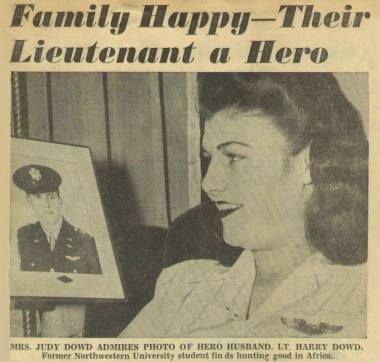
Lt. Dowd Letter
Feb 21st, 1943
Today was the day –Eight from our squadron and 12 from
the 94th started to escort 4 B-25s on an anti
shipping raid between Sicily and Bizerte.
So our fellas had to turn back on account of sand in the
engines and what not and the 94th lost the bombers in
bad weather over the water.
So that left Jim Pate, Hartman and I to escort the 25s.
We had just turned near Sicily to come back when re ran into 50
Ju 52s. Boy what a
surprise. The
ceiling was at 500 feet and we were at 100 and they were at 450.
The wing of the first one I fired at seemed to fall off
and the second one seemed to explode and go down in flames.
Jim had already hit the second one I fired at so I only
got credit for one. We
could not leave the bombers so we had to leave all those 52’s
on their way. Boy
If I could have stayed another 5 minutes we could have gotten
ten a piece. They were unescorted, we think.
The weather was terrible and the bombers wouldn’t
circle so we could only make one pass.
Good nite my dearest wife. I love you and miss you
terribly.
Harry.
God forgive me for
killing the men in those ships.
This war is a terrible thing.
Lt. Radcliffe Letter to the
wife of a missing pilot
Dear
-------,
I received your letter of March 20th and will
now try my best to answer your questions. I wanted to write you sooner but thought I had better wait
until you had received official notice. You
know the army is peculiar about those kind of things.
There really aren’t many facts and I hope the censors
don’t mind me telling them.
On ---------- our Squadron escorted the flying fortresses
on a bombing mission of an airport near Tunis.
Due to a cold and a bad left ear I was unable to go along
that day. Our boys
were attacked by several enemy fighters and during the dog fight
the flights of P-38s got split up.
No one seems to know just what happened, but in some way
or other -------- ended up being alone with four ME 109s on his
tail. The fellows
could hear him on the radio, yet were unable to find out just
where he was and therefore could not go to his aid.
Now these are the straight facts as I have been able to
collect them. I
hope that I am doing the right thing in telling them to you.
Now concerning the possibilities and also my opinion.
It is very hard to shoot down one of our airplanes and
especially hard to hit the pilot.
Therefore even though ------- was out numbered he still
had a pretty good chance of getting to the ground safely.
With one engine or even with both engines shot out he
still might bail out or even make a crash landing safely.
With ---------‘s extremely good flying ability and his
knowledge of air tactics I can’t help but think that he found
some way out.
If you get word that ------ is safe as a prisoner please
let me know and of course I will do the same.
Please give --------’s parents and sisters my regards.
I have never met them but from what I have heard they
must be one swell family.
My best wishes are with you during your days of wondering
and waiting. Also
may God be with you upon the arrival of the little one.
All of us here are waiting, hoping and praying for
------’s safe return.
Sincerely Yours,
Rip
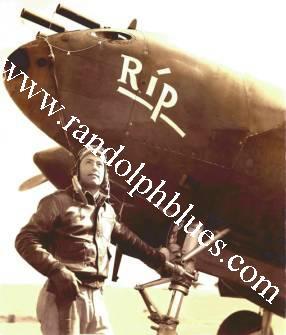
In
order to handle the increased training of pilots, smaller
airbases were located around the country. One was located at Marianna, Florida, about 60 miles west of
Dale Mabry Field. Also
scattered across the country were radio beacon towers that sent
out radio directional beams that were used by the pilots for
navigational purposes. Planes used these radio beacons for cross-country
navigational training. There
was one situated five miles east of the Marianna Army Air Field
just outside of the tiny town of Two Egg.
Two Egg was not much more than a crossroads with two
general stores and less than a dozen houses.
A
mile northeast of Two Egg sat the Hart house.
On the morning of July 18th, 1944, the parents
were gone and the Hart children were left to their own devices.
Not an uncommon occurrence among country families!
Fourteen-year-old Dorothy was out in the yard watching
one of the numerous military planes in the area circle Two Egg. On each pass the plane dipped down over the town and then
rose again into the sky. On
the third pass it struggled for altitude as it headed out east
of town toward the home of her uncle, Tony Horne.
Barely visible over the trees, she watched as it gained a
bit of altitude and then slipped into a left turn and headed
back westward in the direction of the Hart house.
In this new flight path was the home of the Allen family
who were related to the Harts.
Fifteen-year-old
Daisy Allen was in the house at the time as her mother was
preparing the noon meal. Fearing the plane might strike their home, her father rushed
in and ordered the family out of the house, warning that a plane
was about to crash. The
family rushed outside as the plane roared overhead just missing
a cedar tree in their backyard.
A few yards farther on the luck of the plane’s
occupants ran out as the wing and landing gear caught the
treetops in a wooded area behind the house. The plane nosed into
the woods, losing its wings as it struck two large trees and
carved a 100-yard swath through the forest.
Still watching nearby, Dorothy Hart heard an explosion
and saw a ball of flame arise from the woods less than 1000 feet
away. She and her
sister Vera, six, and her brother James, eight, ran over to the
edge of the woods to witness the destruction.
Daisy Allen’s father and older brother rushed to the
site to see if they could assist the two men in the plane but it
was too late. Flames
were already furiously engulfing the fuselage part of the plane
where the pilot and copilot remained. Daisy and her sisters,
Betty and Lena, tried to follow their father into the woods but
were ordered back. As
soon as their father turned back towards the crash they once
again followed behind him.
Soon more small planes were circling overhead to guide in
fire and rescue teams from nearby Marianna Air Field.
|